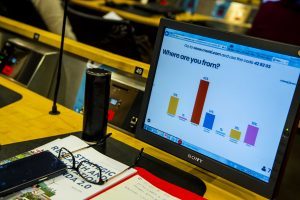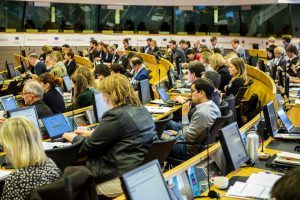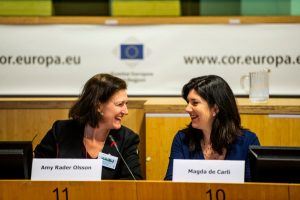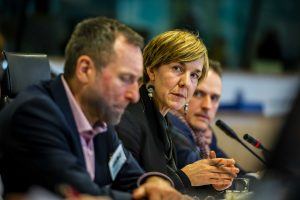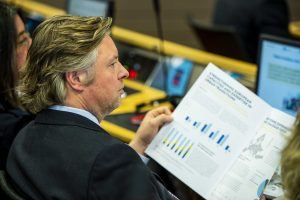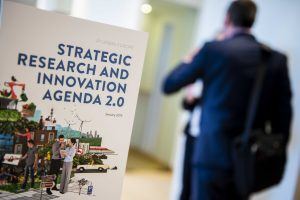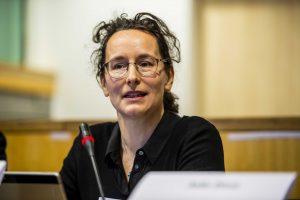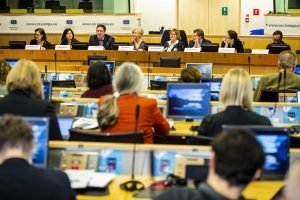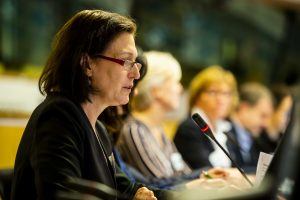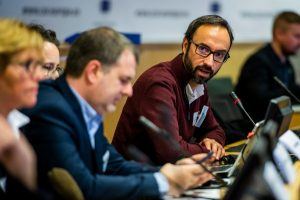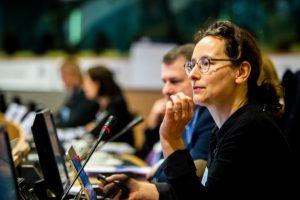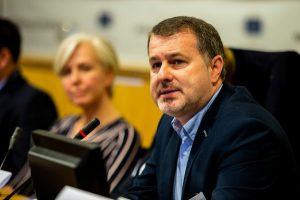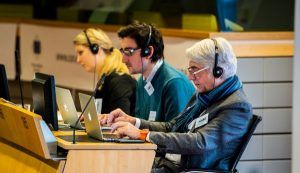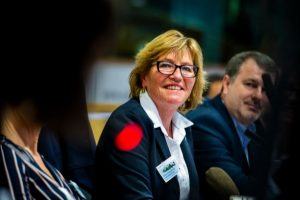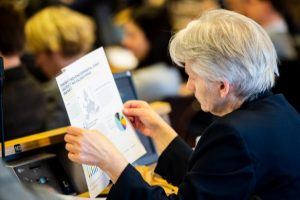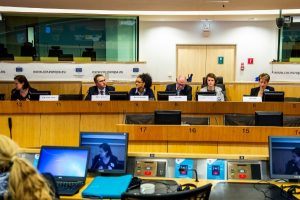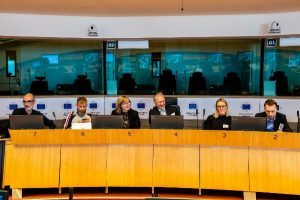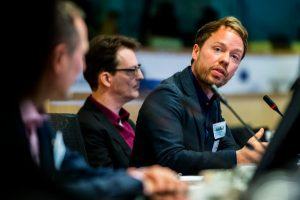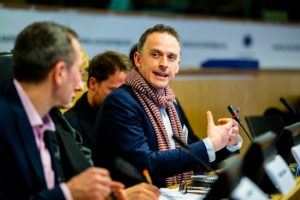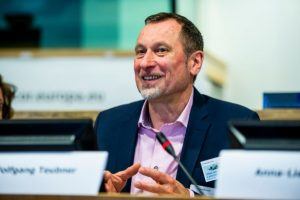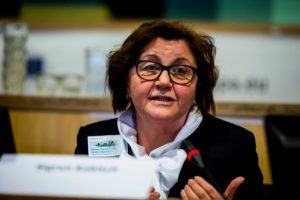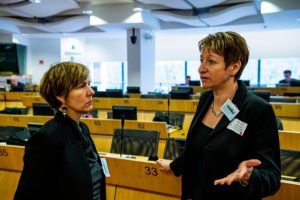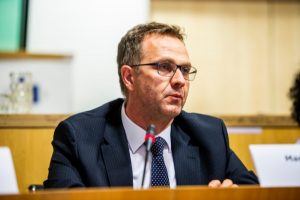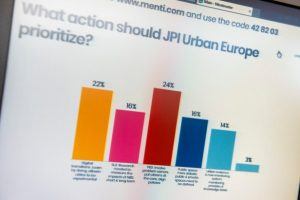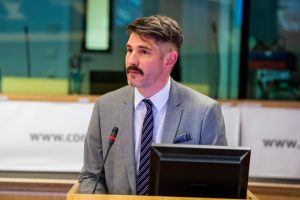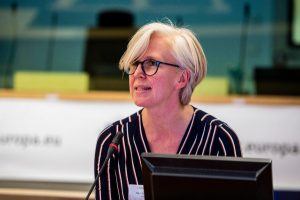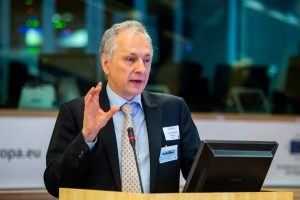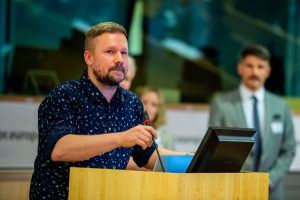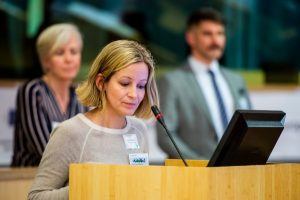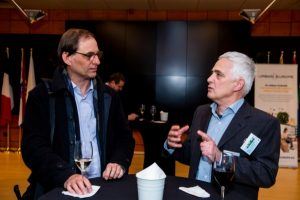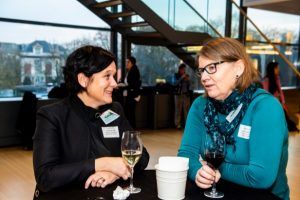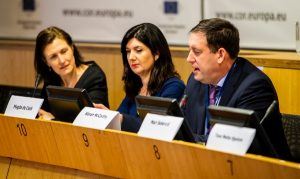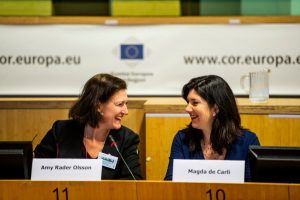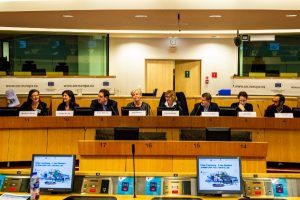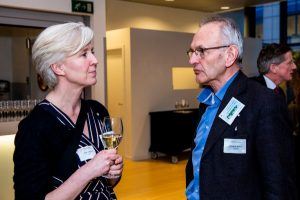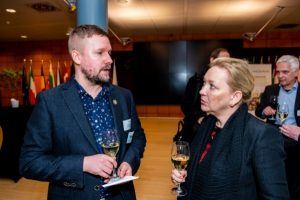Over 200 participants gathered at the European Committee of the Regions on February 12th for the JPI Urban Europe policy conference and the launch of the updated Strategic Research and Innovation Agenda (SRIA 2.0). Some of the participants stayed in Brussels for four days attending side events taking place back-to-back with the event, organized by JPI Urban Europe but also external partners i.e. UN-Habitat, the Urban Agenda for the EU partnerships. You can read SRIA 2.0 here.
In her opening statement Mari Solerød, Acting Chair of the JPI Urban Europe Governing Board, emphasized that JPI Urban Europe presents the SRIA in a spirit of urgency and with an aim to align with European and global policy agendas.
The conference was organized in cooperation with the European Commission and the European Committee of the Regions. To support alignment of JPI Urban Europe activities with the Urban Agenda for the EU partnerships, break-out sessions were jointly organized and used to take concrete steps towards future cooperation and to support the implementation of the EU Urban Agenda and the Sustainable Development Goals (SDG).
In this sense the program featured many cities. Representatives from four cities, from Sortland in northern Norway, via Leipzig in Germany and Alba Iulia in Romania, to Cascais in southern Portugal were invited to speak about their challenges and to give their view on how research and innovation can support cities in concrete terms. An additional 10 case studies from cities, including Oslo, London, Bologna, Zagreb, Amsterdam and Eindhoven, were taken as point of departure in the five break-out sessions.
Opening statements by Kieran McCarthy, City Council of Cork and member of the European Committee of the Regions and Magda Di Carli, DG RTD, stressed the increasing awareness of cities’ importance for sustainable development. It was indicated that cities will be given an even more prominent role in Horizon Europe. Magda De Carli emphasized the role JPI Urban Europe can play in this regard by opening the doors to smaller countries and cities and addressing their specific challenges.
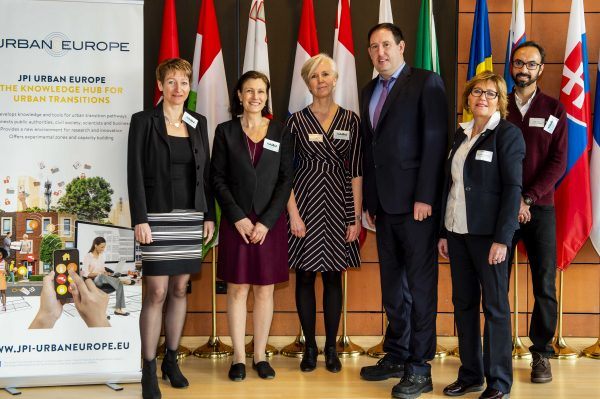
Margit Noll, Amy Rader Olsson, Mari Solerød, Kieran McCarthy, Tove Mette Bjørkmo and João Dinis
The dilemma approach promising to address complex challenges
The SRIA 2.0 identifies and addresses key dilemmas that are created by the plurality of urban challenges, strategies or stakeholder interests. Several speakers acknowledged that the dilemma approach seems promising to address the complexity of urban transitions and is relevant to achieve the Sustainable Development Goals (SDG), particularly since the SDG:s in themselves contain dilemmas and, at times, contradictory goals. Margit Noll, Chair of the JPI Urban Europe Management Board, stressed that dealing with the dilemmas calls for innovation, new approaches and enhanced research and policy capacities.
– “The dilemma approach is innovative and fosters new types of collaborations between scientists and practitioners on an equal footing, said Sigrun Kabisch, Chair of the JPI Urban Europe Scientific Advisory Board.
How this cooperation is to be done in practice was the topic of one of the panel discussions where panelists shared insights on how translation of scientific language into policy language can also help cross disciplinary boundaries between researchers, and how reinventing the rules and ethics for stakeholder engagement is necessary.
A knowledge hub with relevance for European cities and urban actors
Several discussions touched upon JPI Urban Europe as a knowledge hub of relevance to cities.
- Cities face systemic change and need help to reconfigure their role and JPI Urban Europe is an important knowledge hub – making evidence accessible and used, said Anna Lisa Boni, Secretary General Eurocities.
- In designing the instruments, it might be worth to take into consideration to what extent cities digest knowledge that is produced, said Marek Teplansky Acting Head of Unit Inclusive Growth, Urban and Territorial Development, European Commission, Directorate-General Regional and Urban Policy.
In her final words Margit Noll highlighted three core element values that are brought on by the challenges of implementing the SRIA 2.0. Firstly, JPI Urban Europe wants to mobilize and support small and medium size cities, which requires appropriate formats, careful scaling down, adapting and shaping conditions that fit to smaller cities’ needs. Secondly, cities are not seen as ‘end-users’, but as partners. In this sense, JPI Urban Europe does not apply a linear approach which aims to deliver knowledge to cities, but instead strives to engage cities from the start and offer room for experimentation and co-creation. Significant of the latter is the fact that the programme has financed more than 50 urban living labs. Finally, over the last years JPI Urban Europe has cooperated with many units in the European Commission dealing with urban matters, including DG RTD, DG ENER, DG MOVE and DG Regio, and connected the different approaches, the related research communities and urban policies.
–It is a clear aim to strengthen and enhance our role as a knowledge hub on urban transitions in the coming years, said Margit Noll. What is special about Urban Europe and the SRIA 2.0 is therefore not only the dilemma approach itself but also how the partnership shapes an R&I environment that offers new forms for participation and invites more people to the table.
More details from presentations panel discussions
Cities experience the same challenges, there are no alien cities
In the opening of the conference, all sides emphasized the importance of addressing urban challenges and taking advantage of the dynamics in urban development we see all across Europe.
Kieran McCarthy, City Council of Cork and member of the European Committee of the Regions, highlighted that in his travels to cities all over Europe it became evident that cities experience about the same challenges. He has never yet met an “alien” challenge. At the same time cities are determined to act and regularly ask themselves if they are on the ‘right track’.
Magda Di Carli, Head of unit Sharing Excellence – Country Intelligence, European Commission Directorate-General for Research and Innovation, acknowledged the efforts made by JPI Urban Europe to mobilize and engage a broad range of city stakeholders not only in the research and innovation projects but also in the process of updating the agenda. She welcomed the dilemma approach and stressed how increasingly important it is to open the doors to smaller countries and cities and addressing their specific challenges.
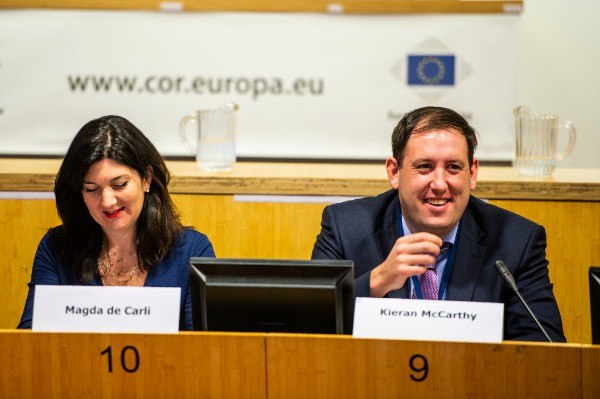
Magda de Carli and Kieran McCarthy
The conference featured cites’ challenges and dilemmas
Representatives from four cities, from Sortland in northern Norway, via Leipzig in Germany and Alba Iulia in Romania, to Cascais in southern Portugal were invited to put forward their challenges and views on how research and innovation can support cities in concrete terms. An additional 10 case studies from cities were presented in five break-out sessions in the afternoon.
Tove Mette Bjørkmo, Mayor of Sortland, brought in the perspective of a small city at the Northern periphery of Europe, where liveability, social cohesion and cultural identity are strengths while innovative solutions to improve the public transport system is an urgent need. Nicolaie Moldovan, City Manager of Alba Iulia, Romania’s second largest city, shared the example of repurposing a central city district with very limited economic resources. They transformed a cultural heritage previously controlled and used by the National Military into a cultural center, open and accessible for the citizens. Transparency and cooperation with international institutes such as Moodys and the World bank and engaging the implementers being part of the strategy together with planned gentrification where empty buildings are turned into a lively neighbourhood for researchers and artists. Beate Ginzel, Head of unit Department of Urban Renewal and Housing Promotion in the City of Leipzig, presented a set of dilemmas created by consecutive phases of shrinkage and (re)growth. She elaborated the challenges in implementing the city housing strategy with an emphasis on affordable housing and balancing the various land use needs and interests. João Dinis, Coordinator of the Department for Climate Change, Cascais, Portugal, focused on the city’s strategy including 27 activities aimed at adapting and mitigating to climate change.
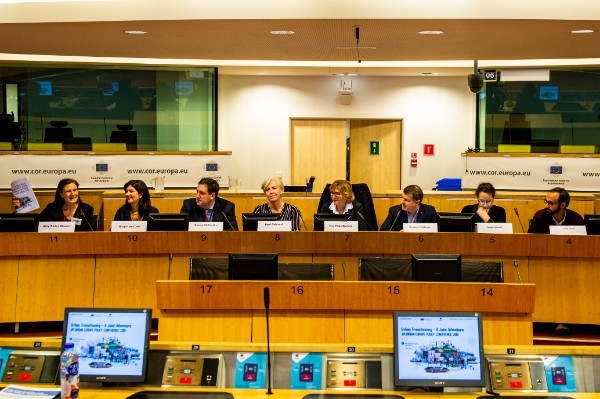
Amy Rader Olsson, Magda de Carli, Kieran McCarthy, Mari Solerød, Tove Mette Bjørkmo, Nicolaie Moldovan, Beate Ginzel and João Dinis
Foregrounding dilemmas as a promising approach to complex urban challenges
Acknowledging the plurality of urban goals, strategies and stakeholder interests, JPI Urban Europe decided to take a dilemma-approach for its updated SRIA. With this, conflicts, trade-offs but also synergies will be addressed that are created by the interrelationships of different cities’ strategies or targets. Margit Noll, Chair of the JPI Urban Europe Management Board, stressed that building upon current pathways and mainstreamed approaches, the SRIA 2.0 highlights areas that require policy attention and call for innovative approaches and solutions. She explained that to tackle complex challenges we need to act along new cooperation models and funding frameworks and the SRIA 2.0 applies a plurality of instruments, with the Urban Living Labs at the heart.
The question from the moderator Amy Rader Olsson, to the speakers of the morning panel, to unpack dilemmas and describe what dilemmas meant to them was met with enthusiasm. Dilemmas were generally seen as promising to address complex challenges in transitioning European cities. Sigrid Kabisch, Chair of the JPI Urban Europe Scientific Advisory Board, said that the dilemma approach is innovative and that it fosters new types of collaboration between scientists and practitioners on an equal footing. Wolfgang Teubner, European Director of ICLEI, emphasized that the sustainable development goals are dilemmas in themselves, including contradictory goals, and that the lack of priorities is a problem. He calls for JPI Urban Europe to help identifying the fundamental priorities for our political environment and how future priority setting can work. Anna Lisa Boni, Secretary General Eurocities, stated that cities face systemic change and need help to reconfigure their role, in this context dilemmas can be useful.
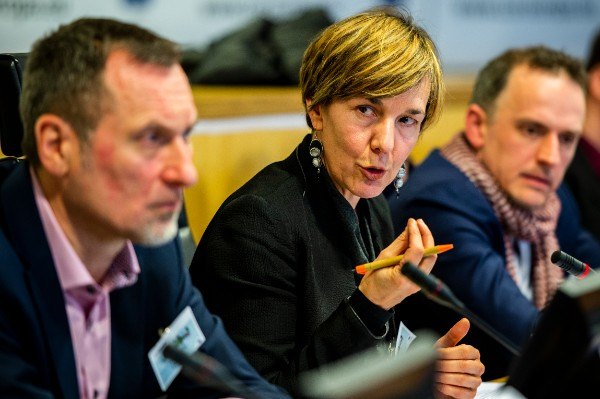
Wolfgang Teubner, Anna Lisa Boni and Jamal Shahin
A panel explored the topic of cooperation between research and cities in practice
The morning panel further explored cooperation between research and cities in practice. Anna Lisa Boni emphasised the difficulties involved in science-policy cooperation. One can fine tune what science delivers, but how do we get science-policy cooperation going on a daily basis? Jamal Shahin, Assisting Professor at the University of Amsterdam, introduced his experiences from an ongoing JPI Urban Europe funded project. He explained that, due to the multidisciplinary approach, it was necessary to change the scientific language into a more policy-oriented one in order to cross disciplinary boundaries and to focus on the partners’ and clients’ needs. Jamal concluded that engaging with citizens is not easy – one has to find arguments that are close to their hearts in order to keep them engaged over time, to motivate them to test new devices or come to meetings. Polyak Levante, one of the founders of Eutropian, stressed the need to reinvent the rules for stakeholder involvement in research and innovation and to apply new ethical standards to empower the participants in the project, not just observe them and sell their knowledge on the market. Martin De Jong, Professor at Erasmus University, Rotterdam, added that dilemmas means dealing with trade-offs in constructive manners but also with potential conflicts. He characterized many of the funded JPI Urban Europe projects as a ‘coalition of the willing’ to solve the dilemmas caused by different interests, and that mainstreaming solutions might involve even tougher struggles.
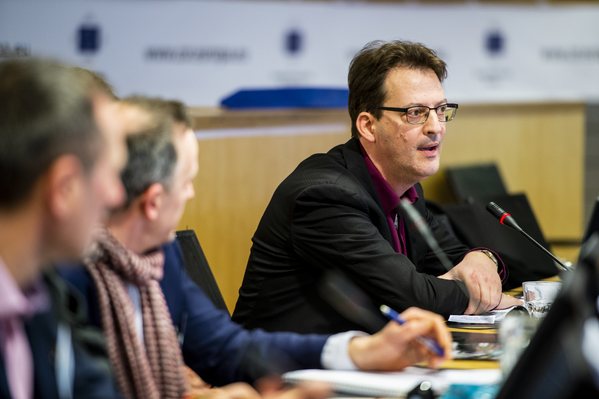
Wolfgang Teubner, Jamal Shahin and Martin De Jong
JPI Urban Europe’s role in the future landscape of partnerships
The conference closed with a discussion on the future role of JPI Urban Europe and the view on how JPI Urban Europe best can support the implementation of urban policy agendas in Europe and internationally.
Mart Grisel, Director EUKN (European Urban Knowledge Network), pointed toward the German presidency and the soon to be revised Leipzig charter. A process has started to collect input on updating the framework for integrated urban development and JPI Urban Europe is seen as a partner to support and contribute to this. Responding to the moderator’s question how JPI Urban Europe concretely can contribute to cohesion policy, Marek Teplansky, Acting Head of Unit Inclusive Growth, Urban and Territorial Development, European Commission, Directorate-General Regional and Urban Policy, referred to how cohesion policy addresses place-based challenges of varied amplitude. It is worth to consider into what extent cities digest knowledge that is produced.
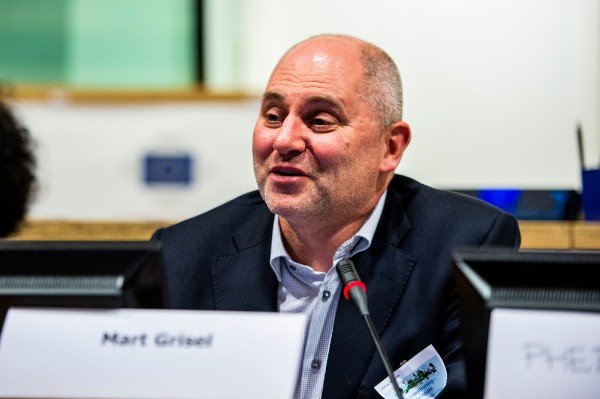
Mart Grisel
Nathalie Noupadja, Head of Research & Studies, CEMR (Council of European Municipalities and Regions), described that local authorities often do not have the human resources to engage in partnerships but that communal networks, such as CEMR, can help to reach-out to cities and act as multipliers. Nathalie also emphasized the importance of an holistic approach to the SDG:s, including diversity in terms of age, gender, geography etc.
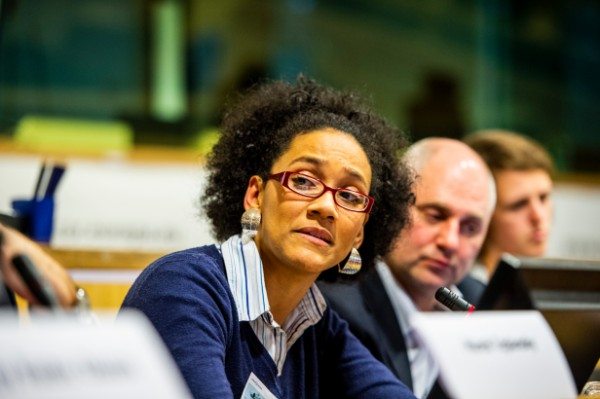
Nathalie Noupadja
Phebe Dudek, Policy Officer, Innovating Cities at European Commission, Directorate for Research and Innovation, explained how Horizon Europe will give more attention to cities and urban matters. An urban-related mission is under discussion and in particular, climate, energy and mobility are examples of important intervention areas in cities.
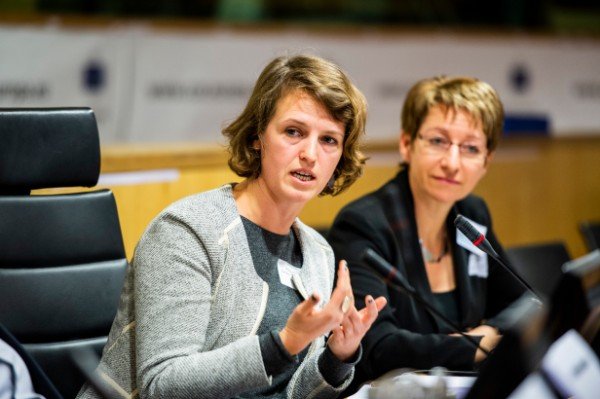
Phebe Dudek and Margit Noll
In her final words Margit Noll, summarized her takeaways from the day in a set of core values which define also challenges for implementation of the SRIA 2.0. JPI Urban Europe wants to mobilize and support small and medium size cities which requires appropriate formats, careful scaling down, adapting and shaping conditions that fit the smaller cities’ needs. Furthermore, cities are not seen as ‘end-users’, but as partners. In this sense, JPI Urban Europe does not apply a linear approach which aims to deliver knowledge to cities, but instead strives to engage cities from the start and offer room for experimentation and co-creation. It is significant that the programme has financed more than 50 urban living labs so far. Finally, over the last years JPI Urban Europe has cooperated with many units in the European Commission dealing with urban matters and connected the different approaches, the related research communities and urban policies. It is the clear aim to strengthen and enhance this role as a knowledge hub on urban transitions in the coming years. Concluding, what is special about Urban Europe is not only the dilemma approach itself but also how an R&I environment is shaped that offers new forms for participation and invites more people to the table.

